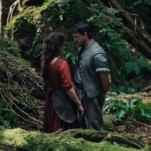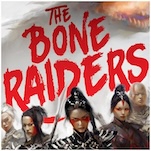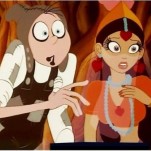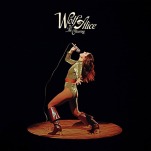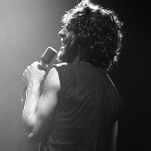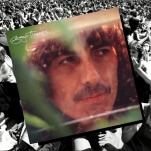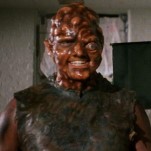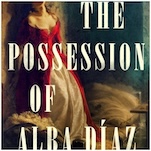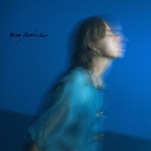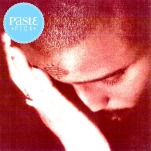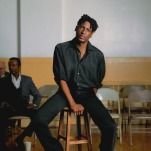The 50 Best Albums of 2010
 20. Suckers: Wild Smile [Frenchkiss]
20. Suckers: Wild Smile [Frenchkiss]
Wild Smile cherrypicks from New York rock history, evoking Talking Heads here, TV on the Radio there, but slowly reveals itself more and more on each listen. In the space of less than a month, Suckers’ reverb-rock masterpiece went from virtual unknown (a nondescript CD sitting on my desk) to blowing up my headphones, car stereo, and anywhere else my friends tolerate my being DJ. I defy you to listen to “It Gets Your Body Movin’” and not do just that.—Michael Saba
 19. Elizabeth Cook: Welder [31 Tigers]
19. Elizabeth Cook: Welder [31 Tigers]
Elizabeth Cook’s last album, the Rodney Crowell-produced Balls, was straight up Dolly-worshippin’ country, full of stretchy peddle steel and yodel-peppered sass. But if Balls was chilled-in-the-box strawberry wine, Welder is mulberry-flavored moonshine: homemade, delicious and completely unsanitary. First of all, there’s Cook’s twangy alto, which used to slip-slide melodically through her lyrics to warm, sweet-as-peach-cobbler effect; on this release, though, her voice is less massaged—shriller, harsher and even more heavily accented—and she doesn’t sing too much. Instead, she chortles and spits and coos and chants. Previous releases were sprinkled with her characteristic wit, which has gone to seed and run wild on Welder. In “El Camino” she recalls delirious sex in a 1972 refurb: “If we get married, gonna have to annul it / Right now my hands are in his mullet.” Hill-top funerals, soup kitchens and backcountry hoe-downs become the stuff of legend in Welder’s emotionally expansive tales, and though it features production by Don Was and guest appearances by Crowell and Buddy Miller, this album is all about Cook finally finding her voice—irreverent, hilarious and gritty as Appalachian soil.—Rachel Dovey
 18. Cee Lo Green: The Lady Killer [Elektra]
18. Cee Lo Green: The Lady Killer [Elektra]
As a solo artist, songwriter, former Goodie Mob rapper, and frontman of chart-topping duo Gnarls Barkley, Green is responsible, at least in part, for some of the most memorable pop songs in recent radio memory, particularly the ubiquitous Gnarls Barkley smash “Crazy,” which is arguably the best pop song of the decade. With “Fuck You,” he’s managed to craft a stellar runner-up. Lyrically, it’s simultaneously foul-mouthed and sweetly naive—one minute, he’s apologizing to his old crush for being broke; the next, he’s casually assaulting her with a cluster of f-bombs, his smooth falsetto and whiney croon stroking soulful pleasure zones untapped since Marvin Gaye’s prime. Despite Green’s trademark quirkiness, he’s never sounded so old-school, reveling in Motown nuance, big Hammond organ trills, and crackling drums. No longer hiding behind the kooky musical frameworks of Gnarls Barkley (or hiding in the shadow of collaborator/producer Danger Mouse), Green progresses as an artist by looking back. Fuck cordiality. With The Lady Killer, Cee Lo Green is out for blood. Track after track, he triumphs.—Ryan Reed
 17. Jónsi: Go [XL]
17. Jónsi: Go [XL]
There’s this thing Jónsi Birgisson does with his voice. You can hear it nearly three-and-a-half minutes into the track “Grow Till Tall” on Go, his first solo record after more than a decade fronting Icelandic ambient-rock outfit Sigur Rós. Jónsi’s fragile, luminescent tenor begins a subtle dance, climbing a few notes up the scale to a moderate plateau and then sliding back down, ascending once more to a comparable altitude, then gliding all the way back down to Earth like a well-built paper airplane. He patiently follows this trance-inducing pattern for a minute or more, creating the illusion of a low vocal ceiling. And then, just as Nico Muhly’s orchestral score begins to swell and fidget restively, Jónsi’s voice suddenly lifts off into the exosphere—effortlessly, like a column of steam rising. By the time his voice reaches its zenith, it’s morphed into a glistening, siren-song falsetto. It would take a philosopher or a theologian, not a music critic, to explain why this voice ties the human throat in knots. Jónsi and collaborators Alex Somers and Peter Katis deserve a Grammy for not only keeping track of the record’s dizzying volume of sonic layers, but for grooming everything to coexist with such confounding rightness. It’s easy to forgive the album’s occasional misfires because it doesn’t tiptoe about, eyes glued to the floor, apologizing for its gargantuan ambition. It does cartwheels when it bloody well feels like it, cries when it wants to, and raises the bar for songwriters like Sufjan Stevens who share similarly heady classical predilections.—Jason Killingsworth
-

-

-

-

-

-

-

-

-

-

-

-

-

-

-

-

-

-

-

-

-

-

-

-

-

-

-

-

-

-

-

-

-

-

-

-

-

-

-

-

 16. Mavis Staples: You Are Not Alone [Anti-]
16. Mavis Staples: You Are Not Alone [Anti-] 15. Justin Townes Earle: Harlem River Blues [Bloodshot]
15. Justin Townes Earle: Harlem River Blues [Bloodshot] 14. Band of Horses: Infinite Arms [Brown Records/Fat Possum/Columbia]
14. Band of Horses: Infinite Arms [Brown Records/Fat Possum/Columbia] 13. Sharon Jones & the Dap-Kings: I Learned the Hard Way [Daptone]
13. Sharon Jones & the Dap-Kings: I Learned the Hard Way [Daptone] 12. Bruce Springsteen: The Promise: The Lost Sessions of Darkness on the Edge of Town [Columbia]
12. Bruce Springsteen: The Promise: The Lost Sessions of Darkness on the Edge of Town [Columbia] 11. The National: High Violet [4AD]
11. The National: High Violet [4AD]